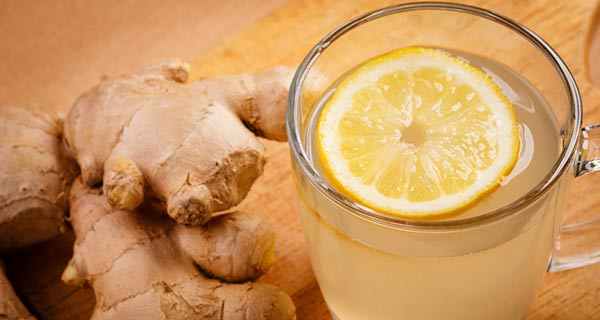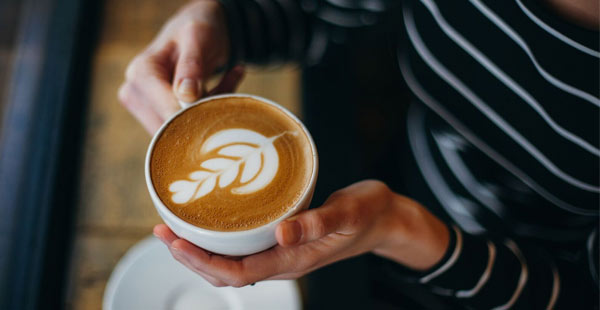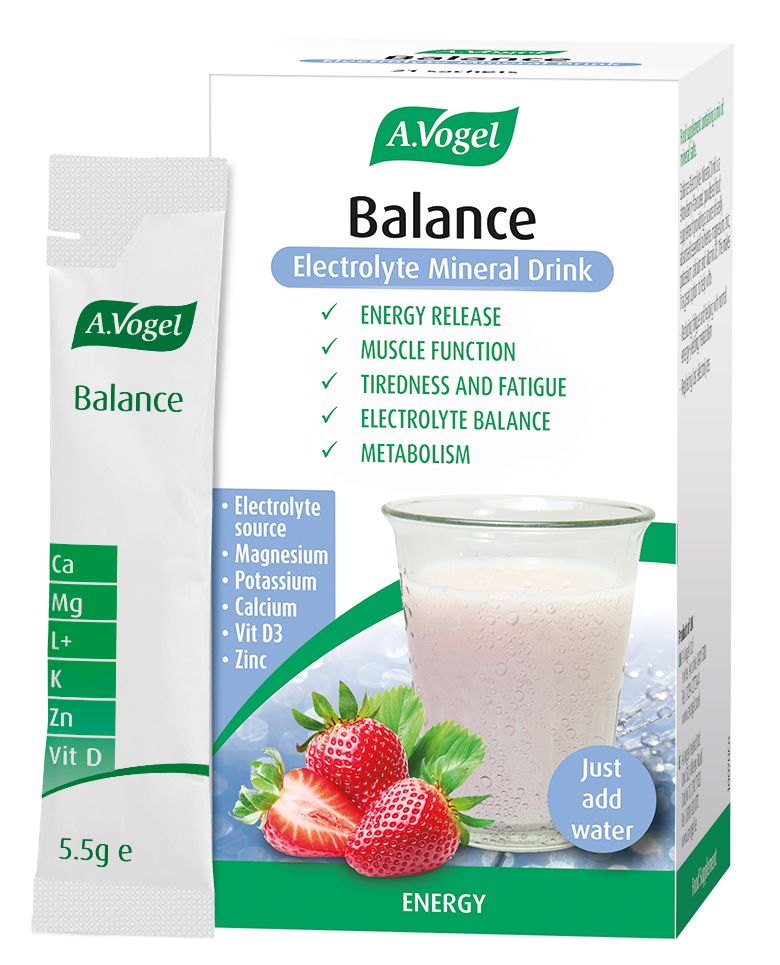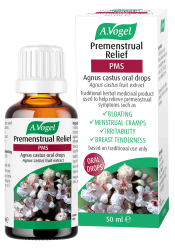What should you drink to help period cramps?
Your diet plays an important role in reducing period cramps; not only what you eat, but what you drink too. As a nutritionist, as well as A.Vogel’s Women’s Health advisor, there are 6 drinks I always recommend which can help to ease period cramps:
- Water
- Healthy caffeine substitutes
- Green smoothies
- Ginger tea
- Chamomile tea
- Peppermint tea.
There are also a few drinks which can make period cramps worse and which I recommend steering clear of, including sugary drinks, coffee, milk and alcohol.
Now, let's go into a little more detail about how the 6 great drinks above can help your period cramps.
1. Water
Keeping yourself hydrated is always essential but it becomes even more important during your period. That's because water helps to support your digestion and avoid unwanted bloating, which is not only uncomfortable, but can often be accompanied by pain as well. Water also helps to support your circulation and take nutrient-rich blood to where it needs to be during your time of the month.
So, one way to help with uncomfortable period cramps and bloating is to up your water intake. Opt for some boiled water that has been cooled slightly until it remains warm, rather than refrigerated water, because your body can use it immediately without having to heat it up.
However, if you want to drink something a little more exciting during your period then you could try our recipe for detox water. With a mixture of fruit and vegetables, this drink is both refreshing and tasty!
Extra advice: Cravings, which can be problematic during your period, can also be a sign of thirst so this problem may be reduced if you keep yourself hydrated. You should try to drink at least 1.5-2 litres of water every day.
My Top Tip:
Balance Mineral Drink contains a sensible dose of magnesium, which can reduce period cramps, as well as other important nutrients like vitamin D and calcium. Just mix it with a glass of water for a refreshing, strawberry flavoured drink!
A.Vogel Balance Electrolyte Mineral Drink with Vitamin D3, Magnesium, Zinc, Potassium and Calcium.
£22.49 (21 x 5.5g sachets) In Stock
2. Healthy coffee substitutes
 In excess caffeine ignites your stress response, plus risks draining some key nutrients as magnesium, and there could be unhelpful when it comes to period cramps.
In excess caffeine ignites your stress response, plus risks draining some key nutrients as magnesium, and there could be unhelpful when it comes to period cramps.
However, if you’d still like to enjoy a hot drink with your breakfast or as an afternoon pick-me-up, you could turn to a herbal tea or try a coffee substitute such as Bambu.
This is made from a mix of organic chicory, Turkish figs, malted barley, wheat and Greek acorns which makes it completely natural. Chicory is known to have a positive impact on the digestive processes so, if you are feeling a little queasy as a result of your period, this coffee substitute can have a doubly useful effect.
It's important to bear in mind that decaf tea or coffee options are often made by extracting the caffeine with the help of chemicals, therefore, simply adding another pro-inflammatory element instead.
Extra advice: Balance Mineral Drink is another great alternative to coffee - its impressive vitamin and mineral content is great natural way to boost your energy!
3. Green smoothies
A good, fresh, nutrient-packed smoothie could help to ease period pain, especially if it's full of leafy green veggies! This kiwi and ginger green smoothie, for example, provides vitamins and minerals that your body may be lacking at this time of the month. Amongst the list of ingredients are almond milk and spinach which are good sources of magnesium and iron.
Many women struggle with fatigue and low energy during their period, and these can be made worse by low iron levels so, at this time, it can prove helpful to up your intake of this valuable mineral. Magnesium, on the other hand, has a relaxing effect on muscles which helps to ease cramps. Plus, it can also impact upon mood, working to reduce anxiety and encourage better sleep!
Or, why not try our super fruit and veg green smoothie? You can choose a range of flavours to add to your smoothie – why not include some flaxseeds for some bloat-busting fibre and anti-inflammatory omega-3? Or, throw in some pineapple for a healthy dose of bromelain, another anti-inflammatory that can help with your period pains. Celery also makes a great addition to any smoothie, as its impressive potassium content can help to manage bloating.
You can also find a whole variety of smoothie recipes on our food hub!
My Self-Care Tip: How to maximise the health benefits of smoothies
It's well recognised that smoothies are good for us, but there are a few things to consider to make sure you are getting the maximum benefits they can provide. Watch my video for my tips on how to make your smoothies even healthier.
4. Ginger tea
Ginger is a great ingredient that can do wonders during your period! It has anti-inflammatory properties so it can help with painful cramps. In fact, research has found that ginger was just as effective as ibuprofen when it came to relieving menstrual pain. (1) Also, if your period is accompanied by nausea, sickness and stomach upset, ginger can help to relieve you of these issues.
You can increase your intake of ginger by putting it in soups or smoothies, though ginger tea is another tasty option. You can buy good quality ginger tea from most health food stores. So, why not swap your usual brew for one flavoured with ginger and see if that helps your cramps?
Extra advice: Make your own ginger tea by steeping some fresh ginger in hot water, adding in a drizzle of honey or a slice of lemon for some extra flavour.

5. Chamomile tea
Research has found that compounds within chamomile tea may prove beneficial for menstrual cramps. (2) This is because these compounds (hippurate and glycine) can help to relieve muscle spasms, as well as working to relax the uterus. Like ginger, chamomile also has anti-inflammatory properties which may help to reduce cramp further.
I think it's also important to note that these caffeine-free drinks are very calming so, if you find that your mood is unpredictable during your period, these could be some great options for you.
6. Peppermint tea
This is yet another tea which is thought to ease period cramps as well as settle digestive issues. One particular study found that peppermint oil relaxes the stomach muscles and reduced both the duration and severity of menstrual cramps for many of the young women who participated. Researchers concluded that this was due to the anti-spasmodic properties of its menthol content. (3)
Tea can be made from the peppermint leaves, which is where oils like menthol can be found and which give this tea its refreshing, minty flavour. So, this makes it a good option to try if you are suffering from nasty period cramps.
Extra advice: Green tea and raspberry leaf tea can be great for reducing period cramps too, thanks to their anti-inflammatory properties!
What drinks should you avoid on your period?
As I’ve discussed in previous blogs, there are a number of foods you should attempt to avoid during your period but, equally, there a few drinks you should steer clear of too.
Sugary drinks
High sugar content in the likes of fizzy juice and energy drinks can cause energy levels to rise rapidly and then crash, which leaves you even more lethargic than when you started. As fatigue is often an issue during your period, it's advisable to steer clear of sugary drinks in case the problem is worsened.
Another reason to forego the fizzy juice is the unnecessary bloating that can come along as a result of the carbonation. This is not something you'll want to deal with if on top of difficult period cramps.
Plus, although good quality dark chocolate contains antioxidants and could potentially help with your period symptoms, hot chocolate drinks should also be avoided. These are often made using a cheaper quality of chocolate and they're usually packed with sugar!
Extra advice: even fruit juices from concentrate can contain lots of sugar so, instead, opt for squash or fresh fruit juice not from concentrate.
Caffeine
This is one to consider limiting during your period, hence my recommendation for herbal teas and coffee substitutes at this time.
As I discussed in my blog, '5 reasons to avoid caffeine during your period', caffeine activates the sympathetic nervous system which can leave you feeling anxious and stressed. Caffeine also influences your blood sugar levels which can have a direct impact on your mood, which isn't exactly ideal if your period means your mood is all over the place anyway.
What's more, caffeine could risk draining some essential nutrients such as magnesium which have an important role in pain perception. (4)
Extra advice: energy drinks, fizzy juice and tea all contain caffeine.

Milk
Milk contains saturated fats which have the potential to increase inflammation and irritation which is, in turn, likely to worsen period pain. Plus, dairy also contains a chemical called prostaglandin which can contribute to cramping. Therefore, this may be another drink that you may want to consider limiting whilst you are on your period, although of course individual factors are also important to consider.
You might want to consider how much milk you may be consuming in total too, as your intake could be adding up if you are opting for various options including hot chocolate and teas throughout the course of a day.
Extra advice: yogurts, milkshakes, cheese, ice cream and butter could all have the potential to cause problems too if it's the case that you are particularly sensitive to dairy. However, you should always chat to a healthcare professional such as nutritionist or a GP if you are keen to cut out any major food groups.
Alcohol
You may also find it helpful to cut back on your alcohol consumption during your period as it can dehydrate you. This, in turn, could make period symptoms like cravings and fatigue more severe. Alcohol is also another inflammatory element of our diet.
Alcohol can have a depressant effect, so if women suffer from PMS already and feel low or moody around their period, then alcohol can risk exacerbating those feelings.
There is also a biological reason that even women who can tolerate alcohol normally, may not tolerate alcohol as well around their period. This is due to lower oestrogen levels at this time which affect some liver enzymes, particularly alcohol dehydrogenase, which is the enzyme that helps break down alcohol.
Extra advice: you can find more information on alcohol and periods in my blog 'Boozy periods: what are the effects?'.
What else can help your period cramps?
So, in this blog we've covered 6 great drinks for period cramps as well as some dietary elements which may not so helpful when it comes to your period. But, what else can you do to help with period cramps?
- Exercise! Although it might not be top of mind during your period when you're not feeling your best, gentle exercise can help to release endorphins and ease the muscles. Check out my blog for some simple exercises to do on your period.
- Up your nutrient intake. Vitamin D can help to reduce your period pain as it reduces your levels of prostaglandins, an inflammatory chemical involved in shedding the uterine lining and contributing to period cramps. Omega-3 can also help here as it is a natural anti-inflammatory. Read my blog for more information on vitamins and minerals to help your period.
- Take a hot bath or use a heat pad. This can help to soothe painful period cramps plus it can help if you suffer from back pain during your period.
- Have an aromatherapy massage. A large review of studies on the use of essential oils found that inhalation, oral use and massage with essential oils reduced period pain more than placebo. (5) Massage can also help to increase blood flow!
- Try acupuncture. It is believed that placing pressure on specific trigger points on the body can relieve pain. One review concluded that acupuncture was more effective than painkillers at reducing period pain.(6)
- Try cinnamon. Studies have found that cinnamon could be beneficial for soothing painful period cramps. You can try adding it to some morning oats for breakfast or make a tasty curry for dinner. Find out more in my blog here.
- Get a good night's sleep. Did you know that, if you're sleep-deprived, you are more likely to be sensitive to pain? What's more, if you suffer from painful period cramps, you can find it difficult to sleep well at night. I advise how to sleep well during your period in this blog.
- Visit your doctor. If period cramps and other symptoms trouble you every month, you should talk to your doctor to find out if there is anything they can offer you for your pain. Painkillers or certain methods of contraception, such as the pill, can be prescribed to manage more serious issues that may be contributing to your period cramps.
Originally published in May 2018, updated and reviewed in May 2022.










